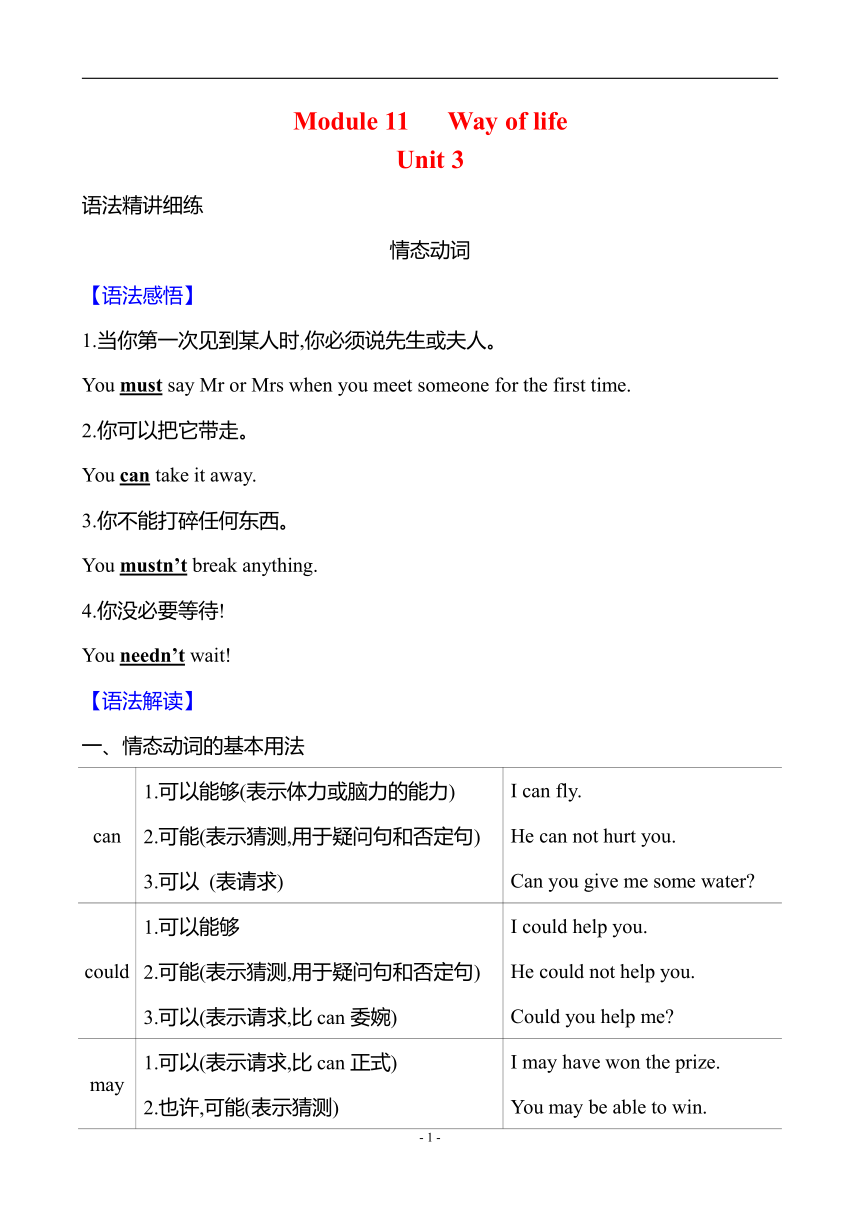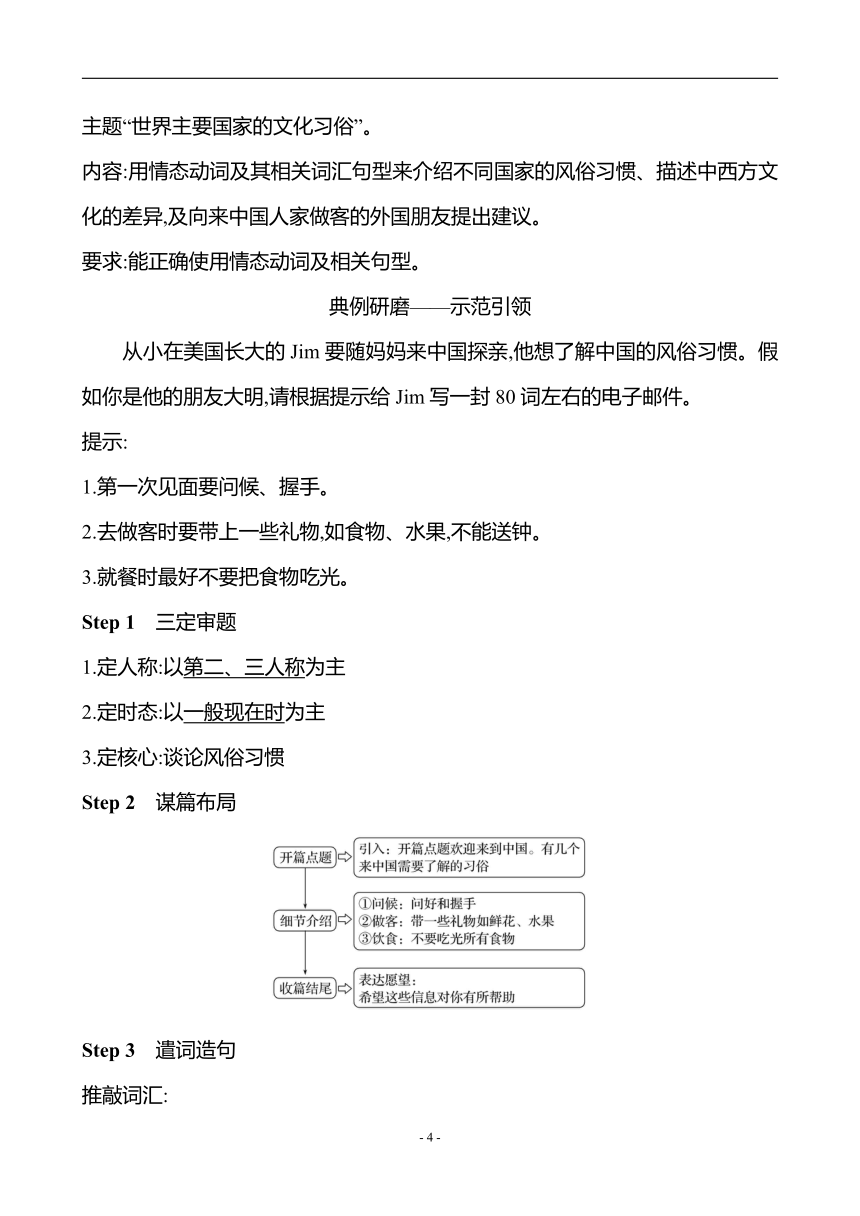Module 11 Way of life Unit 3知识点学案(含答案)外研版英语八年级上册
文档属性
| 名称 | Module 11 Way of life Unit 3知识点学案(含答案)外研版英语八年级上册 |

|
|
| 格式 | docx | ||
| 文件大小 | 105.7KB | ||
| 资源类型 | 教案 | ||
| 版本资源 | 外研版 | ||
| 科目 | 英语 | ||
| 更新时间 | 2024-06-13 00:00:00 | ||
图片预览




文档简介
Module 11 Way of life
Unit 3
语法精讲细练
情态动词
【语法感悟】
1.当你第一次见到某人时,你必须说先生或夫人。
You must say Mr or Mrs when you meet someone for the first time.
2.你可以把它带走。
You can take it away.
3.你不能打碎任何东西。
You mustn’t break anything.
4.你没必要等待!
You needn’t wait!
【语法解读】
一、情态动词的基本用法
can 1.可以能够(表示体力或脑力的能力) 2.可能(表示猜测,用于疑问句和否定句) 3.可以 (表请求) I can fly. He can not hurt you. Can you give me some water
could 1.可以能够 2.可能(表示猜测,用于疑问句和否定句) 3.可以(表示请求,比can委婉) I could help you. He could not help you. Could you help me
may 1.可以(表示请求,比can正式) 2.也许,可能(表示猜测) I may have won the prize. You may be able to win.
might 1.可以(表示允许,比may客气) 2.也许,可能(表示猜测,比may可能性小) You might drink water. I might have brought it.
shall 1.将要(用于第一人称=will) 2.表示征求意见或许可(用于第一、三人称) I shall die. What shall I do
should 1.应该(表示义务、建议、劝告) 2.理应(表示从道理上的合理推断) You should help others. You should apologize.
must 1.必须 2.mustn’t 禁止,不准,不允许 3.一定(表示猜测) I must go. You must not go. It must be his report.
二、情态动词的考点
【考点一】情态动词+动词原形
1.You shouldn’t judge a man always by the clothes.(表示劝告)
2.Would you please tell me where I can find him (表示客气)
3.It must be raining very hard.(表示判断)
【考点二】情态动词的推测用法
1.表示肯定的猜测用must“一定,肯定,准是”(100%的可能性)。
2.表示没有把握的推测用may/might“有可能,也许,或许”(20%—80%的可能性)。
3.表示否定的猜测用can’t“不可能,不会”(可能性为零)。
【考点三】含有情态动词的疑问句的回答
1.must开头的一般疑问句
肯定回答: Yes, 主语+must.
否定回答: No, 主语+needn’t/do(es)n’t have to.
2.need开头的一般疑问句
肯定回答:Yes, 主语+need.
否定回答: No, 主语+needn’t/do(es)n’t have to.
3.may 开头的一般疑问句
肯定回答:Yes, you may./Yes, you can./Sure.
否定回答: No, you can’t/mustn’t.
4.could开头的一般疑问句,表示委婉的语气,此时 could 不表示过去式(would也有一样的用法)
如:—Could I use your pen
—Yes, you can.
【语法精练】
用适当的情态动词填空
1.The train will leave at half past six, so I must get there fifteen minutes earlier.
2.You don’t have to worry about her.She is much better now.
3.With this new lock, you needn’t search for keys in your bag any more.Isn’t it cool
4.That can’t be an alien—there’s no such thing!
5.If you don’t understand the exercise, you can/may ask other students, but you can’t copy others’.
写作素养进阶
主题分析——指明方向
主题:本模块写作情境属于“人与社会”主题范畴中的“历史、社会与文化”,涉及子主题“世界主要国家的文化习俗”。
内容:用情态动词及其相关词汇句型来介绍不同国家的风俗习惯、描述中西方文化的差异,及向来中国人家做客的外国朋友提出建议。
要求:能正确使用情态动词及相关句型。
典例研磨——示范引领
从小在美国长大的Jim要随妈妈来中国探亲,他想了解中国的风俗习惯。假如你是他的朋友大明,请根据提示给Jim写一封80词左右的电子邮件。
提示:
1.第一次见面要问候、握手。
2.去做客时要带上一些礼物,如食物、水果,不能送钟。
3.就餐时最好不要把食物吃光。
Step 1 三定审题
1.定人称:以第二、三人称为主
2.定时态:以一般现在时为主
3.定核心:谈论风俗习惯
Step 2 谋篇布局
Step 3 遣词造句
推敲词汇:
1.欢迎来到 welcome to
2.第一次见面 meet for the first time
3.问好 say hello
4.与某人握手 shake hands with sb.
5.做某事是有礼貌的 be polite to do sth.
6.而且;此外 what’s more
7.最好不要做某事 had better not do sth.
8.吃光;吃尽 eat up
9.玩得开心 have a wonderful time/ enjoy oneself
基础句式:
1.欢迎来到中国。
Welcome to China.
2.有一些你在中国应该知道的习俗。
Here are some customs that you should know in China.
3.他们通常会问好并且相互握手。
They usually say hello and shake hands with each other.
4.你带一份礼物是礼貌的。
It is polite to take a gift with you.
5.你禁止带钟表。
You mustn’t take a clock.
6.你不要吃光食物。
You can not eat up all the food.
7.希望你在中国度过美好时光。
I hope you can enjoy your stay in China.
升级句式:
1.将基础句式3升级为含when引导的时间状语从句的复合句。
When people meet for the first time,they usually say hello and shake hands with each other.
2.将基础句式4升级为含if引导的条件状语从句的复合句。
If someone invites you to his home,it is polite to take a gift with you.
3.将基础句式6用连词however引导,使用情态动词had better (not)。
However,you had better not eat up all the food.
Step 4 润色成篇
Dear Jim, Welcome to China.Here are some customs that you should know in China.They may help you. In China, when people meet for the first time,they usually say hello and shake hands with each other.If someone invites you to his home, it is polite to take a gift such as some food, fruit and flowers.① But you mustn’t give a clock as a gift.While you are eating, you mustn’t speak to others with food in your mouth.② What’s more, you’d better not eat up all the food because it is bad manners.③ So much for this.I hope you will enjoy your stay in China.④ Yours, Daming ①if引导的条件状语从句和“it is+adj.+to do sth.”句式,表明了去别人家做客时应该做的事情。 ②使用情态动词must的否定形式mustn’t,告诫Jim去别人家做客时不能做的事情。 ③运用what’s more及had better
(not)do sth.结构,交代了吃饭时要注意的事项。 ④运用“I hope +宾语从句”表达美好祝愿。
实战写作——迁移创新
假如你是王平,你的外国网友Jack对中国的传统节日——春节非常感兴趣,请你写一封邮件,向他做一下介绍。
1.要点包括:节日简介、节日准备、节日活动等。
2.词数:100左右。开头和结尾已给出,不计入总词数。
3.提示词:the Spring Festival, get together, clean up, on the eve of(在……前夕), be dressed in...,lucky money(压岁钱)
Dear Jack,
How are you I’m really glad that you are interested in traditional Chinese festivals._____________________________________________________________
________________________________________________________________________________________________________________________________________
Yours,
Wang Ping
【参考范文】
Dear Jack,
How are you I’m really glad that you are interested in traditional Chinese festivals.Of all the traditional festivals, the Spring Festival is the most important one to the Chinese people.
Several days before the Spring Festival, people begin to prepare for it.They usually buy meat, fish and vegetables.And they clean up their houses as well.
On the eve of the Spring Festival, the whole family get together and have a big dinner.After the meal people watch TV until twelve o’clock.On the first day of the Spring Festival, most people are dressed in new clothes and then visit their friends and relatives.When meeting others, they say“Happy New Year” to each other.On that day children can receive lucky money from their parents and relatives.
All the people have a great time.
Yours,
Wang Ping
- 8 -
Unit 3
语法精讲细练
情态动词
【语法感悟】
1.当你第一次见到某人时,你必须说先生或夫人。
You must say Mr or Mrs when you meet someone for the first time.
2.你可以把它带走。
You can take it away.
3.你不能打碎任何东西。
You mustn’t break anything.
4.你没必要等待!
You needn’t wait!
【语法解读】
一、情态动词的基本用法
can 1.可以能够(表示体力或脑力的能力) 2.可能(表示猜测,用于疑问句和否定句) 3.可以 (表请求) I can fly. He can not hurt you. Can you give me some water
could 1.可以能够 2.可能(表示猜测,用于疑问句和否定句) 3.可以(表示请求,比can委婉) I could help you. He could not help you. Could you help me
may 1.可以(表示请求,比can正式) 2.也许,可能(表示猜测) I may have won the prize. You may be able to win.
might 1.可以(表示允许,比may客气) 2.也许,可能(表示猜测,比may可能性小) You might drink water. I might have brought it.
shall 1.将要(用于第一人称=will) 2.表示征求意见或许可(用于第一、三人称) I shall die. What shall I do
should 1.应该(表示义务、建议、劝告) 2.理应(表示从道理上的合理推断) You should help others. You should apologize.
must 1.必须 2.mustn’t 禁止,不准,不允许 3.一定(表示猜测) I must go. You must not go. It must be his report.
二、情态动词的考点
【考点一】情态动词+动词原形
1.You shouldn’t judge a man always by the clothes.(表示劝告)
2.Would you please tell me where I can find him (表示客气)
3.It must be raining very hard.(表示判断)
【考点二】情态动词的推测用法
1.表示肯定的猜测用must“一定,肯定,准是”(100%的可能性)。
2.表示没有把握的推测用may/might“有可能,也许,或许”(20%—80%的可能性)。
3.表示否定的猜测用can’t“不可能,不会”(可能性为零)。
【考点三】含有情态动词的疑问句的回答
1.must开头的一般疑问句
肯定回答: Yes, 主语+must.
否定回答: No, 主语+needn’t/do(es)n’t have to.
2.need开头的一般疑问句
肯定回答:Yes, 主语+need.
否定回答: No, 主语+needn’t/do(es)n’t have to.
3.may 开头的一般疑问句
肯定回答:Yes, you may./Yes, you can./Sure.
否定回答: No, you can’t/mustn’t.
4.could开头的一般疑问句,表示委婉的语气,此时 could 不表示过去式(would也有一样的用法)
如:—Could I use your pen
—Yes, you can.
【语法精练】
用适当的情态动词填空
1.The train will leave at half past six, so I must get there fifteen minutes earlier.
2.You don’t have to worry about her.She is much better now.
3.With this new lock, you needn’t search for keys in your bag any more.Isn’t it cool
4.That can’t be an alien—there’s no such thing!
5.If you don’t understand the exercise, you can/may ask other students, but you can’t copy others’.
写作素养进阶
主题分析——指明方向
主题:本模块写作情境属于“人与社会”主题范畴中的“历史、社会与文化”,涉及子主题“世界主要国家的文化习俗”。
内容:用情态动词及其相关词汇句型来介绍不同国家的风俗习惯、描述中西方文化的差异,及向来中国人家做客的外国朋友提出建议。
要求:能正确使用情态动词及相关句型。
典例研磨——示范引领
从小在美国长大的Jim要随妈妈来中国探亲,他想了解中国的风俗习惯。假如你是他的朋友大明,请根据提示给Jim写一封80词左右的电子邮件。
提示:
1.第一次见面要问候、握手。
2.去做客时要带上一些礼物,如食物、水果,不能送钟。
3.就餐时最好不要把食物吃光。
Step 1 三定审题
1.定人称:以第二、三人称为主
2.定时态:以一般现在时为主
3.定核心:谈论风俗习惯
Step 2 谋篇布局
Step 3 遣词造句
推敲词汇:
1.欢迎来到 welcome to
2.第一次见面 meet for the first time
3.问好 say hello
4.与某人握手 shake hands with sb.
5.做某事是有礼貌的 be polite to do sth.
6.而且;此外 what’s more
7.最好不要做某事 had better not do sth.
8.吃光;吃尽 eat up
9.玩得开心 have a wonderful time/ enjoy oneself
基础句式:
1.欢迎来到中国。
Welcome to China.
2.有一些你在中国应该知道的习俗。
Here are some customs that you should know in China.
3.他们通常会问好并且相互握手。
They usually say hello and shake hands with each other.
4.你带一份礼物是礼貌的。
It is polite to take a gift with you.
5.你禁止带钟表。
You mustn’t take a clock.
6.你不要吃光食物。
You can not eat up all the food.
7.希望你在中国度过美好时光。
I hope you can enjoy your stay in China.
升级句式:
1.将基础句式3升级为含when引导的时间状语从句的复合句。
When people meet for the first time,they usually say hello and shake hands with each other.
2.将基础句式4升级为含if引导的条件状语从句的复合句。
If someone invites you to his home,it is polite to take a gift with you.
3.将基础句式6用连词however引导,使用情态动词had better (not)。
However,you had better not eat up all the food.
Step 4 润色成篇
Dear Jim, Welcome to China.Here are some customs that you should know in China.They may help you. In China, when people meet for the first time,they usually say hello and shake hands with each other.If someone invites you to his home, it is polite to take a gift such as some food, fruit and flowers.① But you mustn’t give a clock as a gift.While you are eating, you mustn’t speak to others with food in your mouth.② What’s more, you’d better not eat up all the food because it is bad manners.③ So much for this.I hope you will enjoy your stay in China.④ Yours, Daming ①if引导的条件状语从句和“it is+adj.+to do sth.”句式,表明了去别人家做客时应该做的事情。 ②使用情态动词must的否定形式mustn’t,告诫Jim去别人家做客时不能做的事情。 ③运用what’s more及had better
(not)do sth.结构,交代了吃饭时要注意的事项。 ④运用“I hope +宾语从句”表达美好祝愿。
实战写作——迁移创新
假如你是王平,你的外国网友Jack对中国的传统节日——春节非常感兴趣,请你写一封邮件,向他做一下介绍。
1.要点包括:节日简介、节日准备、节日活动等。
2.词数:100左右。开头和结尾已给出,不计入总词数。
3.提示词:the Spring Festival, get together, clean up, on the eve of(在……前夕), be dressed in...,lucky money(压岁钱)
Dear Jack,
How are you I’m really glad that you are interested in traditional Chinese festivals._____________________________________________________________
________________________________________________________________________________________________________________________________________
Yours,
Wang Ping
【参考范文】
Dear Jack,
How are you I’m really glad that you are interested in traditional Chinese festivals.Of all the traditional festivals, the Spring Festival is the most important one to the Chinese people.
Several days before the Spring Festival, people begin to prepare for it.They usually buy meat, fish and vegetables.And they clean up their houses as well.
On the eve of the Spring Festival, the whole family get together and have a big dinner.After the meal people watch TV until twelve o’clock.On the first day of the Spring Festival, most people are dressed in new clothes and then visit their friends and relatives.When meeting others, they say“Happy New Year” to each other.On that day children can receive lucky money from their parents and relatives.
All the people have a great time.
Yours,
Wang Ping
- 8 -
同课章节目录
- Module 1 How to learn English
- Unit 1 Let's try to speak English as much as possi
- Unit 2 You should smile at her.
- Unit 3 Language in use .
- Module 2 My home town and my country
- Unit 1 It's taller than many other buildings.
- Unit 2 Cambridge is a beautiful city in the east o
- Unit 3 Language in use .
- Module 3 Sports.
- Unit 1 Nothing is more exciting than playing tenni
- Unit 2 This year we training more carefully.
- Unit 3 Language in use .
- Module 4 Planes, ships and trains .
- Unit 1 He lives the farthest from school.
- Unit 2 What is the best way to travel.
- Unit 3 Language in use .
- Module 5 Lao She Teahouse.
- Unit 1 I wanted to see the Beijing Opera.
- Unit 2 It descibes the changes in Chinese society.
- Unit 3 Language in use .
- Module 6 Animals in danger.
- Unit 1 It allows people to get closer to them .
- Unit 2 The WWF is working hard to save them all.
- Unit 3 Language in use .
- Revision module A
- Module 7 A famous story
- Unit 1 Alice was sitting with her sister by the ri
- Unit 2 She was thinking about her cat.
- Unit 3 Language in use .
- Module 8 Accidents
- Unit 1 While the car were changing to red, a car s
- Unit 2 I was trying to pick it up when it bite me
- Unit 3 Language in use .
- Module 9 Population
- Unit 1 The population of China is about 1.37 billi
- Unit 2 Arnwick was a city with 200,000 people.
- Unit 3 Language in use .
- Module 10 The weathe
- Unit 1 It might snow.
- Unit 2 The weather is fine all year round.
- Unit 3 Language in use .
- Module 11 Way of life
- Unit 1 In China ,we open a gift later.
- Unit 2 In England, you usually drink tea with milk
- Unit 3 Language in use .
- Module 12 Help
- Unit 1 What should we do before help arrives?
- Unit 2 Stay away from windows and heavy furniture.
- Unit 3 Language in use .
- Revision module B
